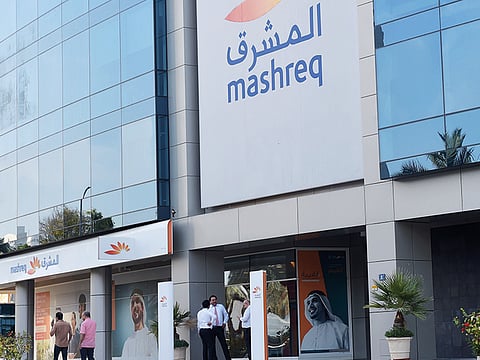Mashreq calibrates HR strategy for digital transformation
Implementation of ‘Agile’ has seen a significant decrease in the reject rate of cases submitted for underwriting

Dubai: Mashreq, one of the oldest financial institutions in the UAE, is working on a novel human resource (HR) strategy to suit the requirements of its ongoing digital transformation, Ashfaq Bandey, vice-president of Human Resources, told Gulf News in an interview.
The bank, which has an extensive branch network across the UAE and a presence across 11 countries, has always been a pioneer in innovations.
As digital transformation becomes the watchword in the financial services industry, Mashreq has now embarked on a journey to innovate and digitise its functions to keep abreast of the latest global trends.
Besides the initial scepticism and resistance to change from some quarters, changing to a new operating model was much like changing wheels of a moving vehicle.”
Mashreq’s CEO Abdul Aziz Al Ghurair, an ardent believer in a technology-driven future for the bank is keen to leverage on the bank’s historical strength in innovation and extend it to the digital space.
In addition to the adoption of new ideas and cutting-edge technologies, Mashreq is keen on attracting and developing a digitally savvy workforce.
“Innovation has always been at the heart of Mashreq. As we celebrated 50 years of our existence, our CEO pertinently reminded us, ‘What got us here will not be the same as what will help us remain a pioneer in the next 50 years’. This line holds deep significance because it charts out both a direction and responsibility for each one of us at Mashreq,” said Bandey.
The bank started its branch transformation focused on enhancing customer experience and round the clock services way ahead of its peers in the industry.
Agile transformation
Mashreq began the implementation of ‘Agile’ transformation from early this year. Agile is a programme to change the organisation’s nature gradually to one that is able to embrace and thrive in a flexible, collaborative, self-organising and fast-changing environment.
“Mashreq’s new ‘Agile’ journey complements its existing digital strategies by focusing on internal changes, with key objectives such as strong financial performance, operational efficiency achieved through digital sourcing and fulfilment and further enhancing customer experience by streamlining their end-to-end experiences with improved turnaround time,” said Bandey.
The adoption of Agile structure saw the bank decentralising enabler functions, and creating dynamic and nimble teams comprised of sales, service and product teams. Each team is essentially self-sufficient, allowing them take full ownership and responsibility to deliver on the customer promise.
One of the objectives of Agile is to improve staff experience through process improvements, system enhancements, empowerment and the enabling of more transparency.
“Post implementation of Agile, there has been a significant reduction in [the] reject rate of cases submitted for underwriting, as well as in rework. This not only leads to an enhanced customer experience but essentially also translates to highly engaged, more productive and happier employees,” he said.
Agile led to a paradigm shift — both in terms of mindsets and fundamentally, in the way the bank operates.
“Besides the initial scepticism and resistance to change from some quarters, changing to a new operating model was much like changing wheels of a moving vehicle. Care had to be taken to minimise disruption while processes were overhauled, and policies and structures aligned to be flexible enough to change to respond to challenges and opportunities. Internal communication played a pivotal role to allay any fears of staff impact,” said Bandey.
Mashreq is the first bank in the region to implement Agile at such a large scale.
“We have essentially created a ‘safe to fail’ environment and openly discuss mistakes. Organisations usually play it safe and continue with the recipe that has led to success in past and probably continues to do so now. However, we were brave enough to experiment and tell ourselves that it is okay to fail as long as we quickly learn from such experiences and persevere to future-proof our business and resources,” he said.



